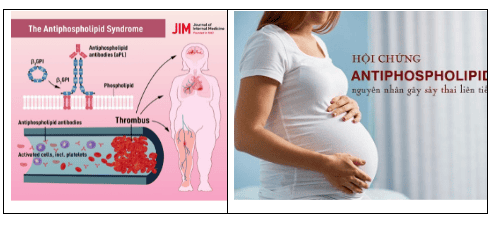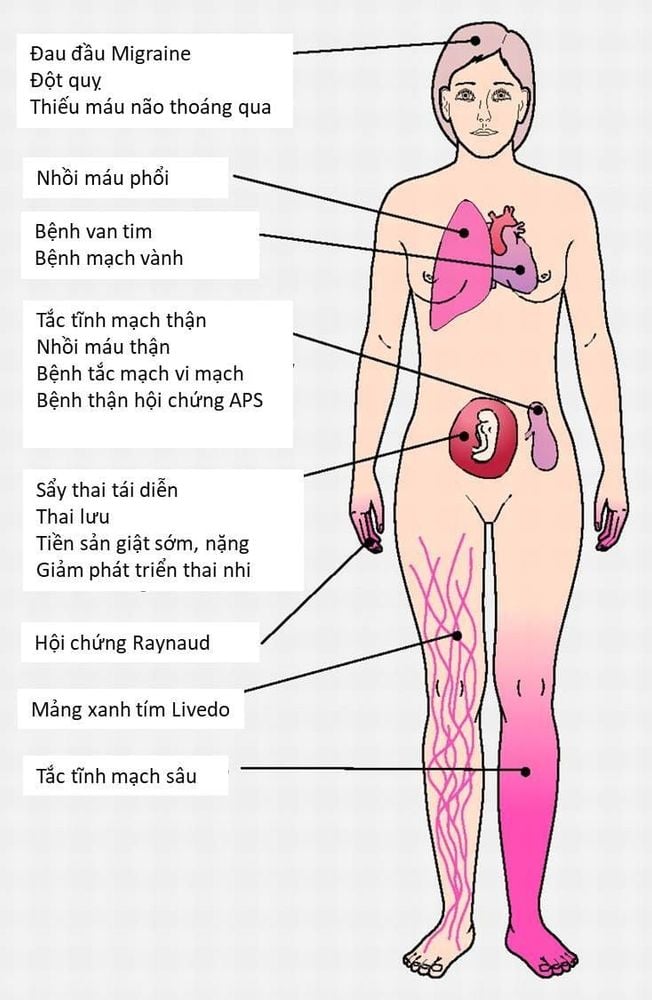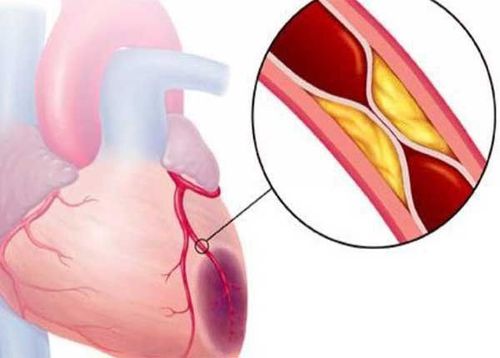This is an automatically translated article.
Article by a doctor of Hematology - Blood Transfusion - Laboratory Department - Vinmec Ha Long International General Hospital.
Pregnant women with anti-phospholipid syndrome will increase the risk of intrauterine growth retardation and other dangerous complications such as pre-eclampsia, stillbirth... However, antiphospholipid syndrome is not always Everyone shows obvious symptoms, many people have antiphospholipid syndrome but don't know it.
1. What is Anti-Phospholipid Syndrome (APS)?
Anti-Phospholipid Syndrome (APS) is an autoimmune disease. When infected, the antibodies in the immune system will mistakenly recognize phospholipids as harmful substances and attack it, while phospholipids are the building blocks of cells. This attack causes cells to be damaged, leading to the formation of blood clots in the arteries and veins, leading to symptoms such as pulmonary infarction, stroke, myocardial infarction, venous thrombosis. deep, transient myocardial ischemia, valvular disease, epilepsy ... dangerous to the patient's health.For pregnant women with Phospholipid syndrome will increase the risk of intrauterine growth retardation and other dangerous complications such as pre-eclampsia, stillbirth, recurrent miscarriage. The blood clots that form in the placenta will interfere with the metabolism between the mother and the fetus. However, antiphospholipid syndrome does not always present obvious symptoms, many people with antiphospholipid syndrome do not know it. Pregnant women with Phospholipid syndrome can have a successful delivery without experiencing any symptoms.

Hội chứng kháng Phospholipid (APS) với phụ nữ mang thai
2. What are the symptoms of antiphospholipid syndrome?
- Blood clots appear in veins, arteries and lungs
- Blood platelet count is low
- Anemia
- Skin color change
- Stroke
- Preterm birth
- Stillbirth
- Preeclampsia
- Repeated miscarriage...

Hội chứng kháng Phospholipid
3. Maternity events may occur in women with antiphospholipid syndrome
Pregnant women with antiphospholipid syndrome will have at least one unexplained stillbirth (without fetal abnormalities) at 10 weeks of gestation or more. No fetal abnormality must be confirmed by ultrasound or by fetal examination
Concurrently, at least one unexplained preterm birth (no fetal abnormalities) before 34 weeks of gestation due to:
Severe eclampsia or pre-eclampsia Signs of placental insufficiency At least 3 consecutive random miscarriages before 10 weeks of pregnancy not due to maternal anatomical or hormonal abnormalities as well as chromosomal abnormalities .
4. Diagnostic test criteria for antiphospholipid syndrome
Criteria include:
Positive anticardiolipin antibodies IgG and/or IgM moderate or higher titers on at least 2 tests 12 weeks apart as determined by standard ELISA test Presence of The presence of lupus anticoagulant antibodies in plasma, at least twice 12 weeks apart, was determined according to the guidelines of the International Society for Thromboembolism and Hemolysis. at least 12 weeks apart as determined by standard ELISA Antiphospholipid syndrome is defined as having at least 1 clinical and 1 laboratory criterion, where the first test was performed at least least 12 weeks from the onset of clinical symptoms.

Xét nghiệm chẩn đoán hội chứng kháng Phospholipid
4. Can women with antiphospholipid syndrome get pregnant safely?
Women diagnosed with antiphospholipid syndrome are advised to plan for any future pregnancies. This is because treatment to improve pregnancy outcomes is most effective when it is started as soon as possible after trying to conceive.
If you are having trouble getting pregnant, have a miscarriage or know that you have anti-Phospholipid syndrome, go to the Hospital for examination and follow-up treatment. Your doctor will recommend reproductive immunotherapy or anticoagulant therapy to reduce the risk of blood clots during pregnancy.

Sản phụ mắc hội chứng kháng Phospholipid gây rối loạn đông máu
Follow-up of a pregnancy with high-risk antiphospholipid syndrome includes regular visits to a qualified health care facility with routine care as follows:
Checks for high blood pressure Blood tests check fetal heart rate Ultrasound to check fetal growth, Doppler Ultrasound to check the mother's blood flow. As APS can be a life-threatening illness for both mother and child, seek medical attention if the following symptoms are present:
Difficulty speaking or smiling Difficulty moving arms Difficult walking Difficulty walking Swollen legs .. .
5. Lifestyle changes when having antiphospholipid syndrome
If diagnosed with antiphospholipid syndrome, it is important to take all possible steps to reduce the risk of blood clots forming. Effective ways to achieve this include:
If the patient is pregnant need regular check-ups and necessary follow-up tests Don't smoke because Nicotine in cigarettes can increase the risk of blood clots. blood Exercise regularly Maintain a reasonable weight and lose weight if obese (with a body mass index of 30 or more) A healthy, nutritionally complete diet, especially in need of increased fiber supplementation , vitamins found in green vegetables, fruits, and at the same time limit eating foods high in carbohydrates Limit drinking a lot of alcohol Do not use birth control pills because it also increases the risk of blood clots Now, Maternity Services The package at Vinmec will help pregnant women's pregnancy become lighter and safer. During pregnancy, pregnant women will be examined by top doctors in the Obstetrics and Gynecology Department with high professional qualifications and experience, giving the best advice and treatment for the health of both mother and child. little.
Please dial HOTLINE for more information or register for an appointment HERE. Download MyVinmec app to make appointments faster and to manage your bookings easily.
References:
Lim W. AntiPhospholipid Syndrome. Hematology Am Soc Hematol Educ Program 2013; 2013:675.













